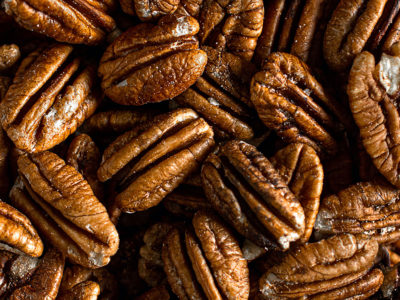The pecan tree, Carya illinoinensis, is a member of the hickory plant family that is native to Mexico that has been domesticated and eaten for many years. The natural range of pecan trees in the United States rungs through Texas and then up the Mississippi river and then up to the southern Midwest. Pecans grow in a shell, and the pecan portion that we consume is removed (and that’s generally how we buy them). Since pecans are a tree nut, that means that they are not AIP-friendly; I’ve written about the reasoning behind this on the blog: The WHYs behind the Autoimmune Protocol: Nuts and Seeds. Since pecans are such a lovely mild nut, however, I do have some recipes that have include them for those who have successfully reintroduced them or aren’t AIP, including my Strawberry-Basil Salad with Toasted Pecans, Pecan Pie, and Paleo Cinnamon Buns.
Pecans are a great source of nutrition if you are able to tolerate them. Pecans are mostly fat (about 72% of 100g), including saturated fat as well as mono- and polyunsaturated, but are also an excellent source of fiber (10% of 100g). 100g of pecans is a very rich source of vitamins B1, B2, B5, and B6; as well as the dietary minerals iron, magnesium, phosphorus, zinc, and manganese.
Pecans are conveniently available for purchase on Amazon.


 Asparagus
Asparagus